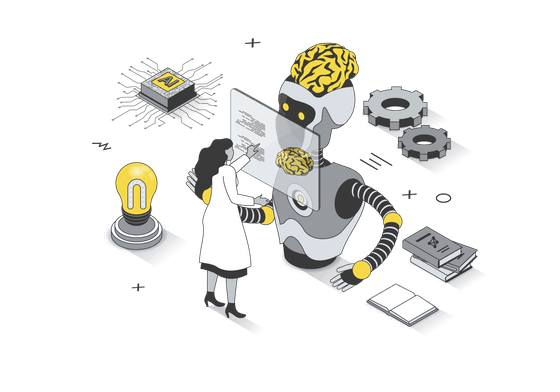President Biden issues executive order regarding AI, legal regulations will be implemented to make AI safe, secure, and reliable

At the same time as AI technology is rapidly developing, laws regarding AI are being created in countries around the world. Among them, in the United States, where many AI companies are based, President Biden issued an executive order on safe, secure, and reliable AI on October 30, 2023.
FACT SHEET: President Biden Issues Executive Order on Safe, Secure, and Trustworthy Artificial Intelligence | The White House
President Biden and Vice President Harris Deliver Remarks on Artificial Intelligence - YouTube
The executive order establishes new standards for the safety and security of AI, protects privacy, promotes equity and civil rights, protects consumers and workers, fosters innovation and competition, and empowers the world. and to improve American leadership. At the time of article creation, only the fact sheet has been published, but the final text is expected to be published soon.
The specific contents are as follows.
◆New standards for AI safety and security
As AI capabilities increase, so will the impact on public safety and security. With this executive order, the president directs the most sweeping measures yet to protect Americans from the potential risks of AI systems.
Require developers of the most powerful AI systems to share safety test results and other critical information with the U.S. government. Pursuant to the Defense Production Act, the order requires companies that develop underlying models that pose a significant risk to national security, national economic security, or national public health and safety to notify the federal government when training their models or , and require all red team safety testing results to be shared. These measures ensure the safety, security, and reliability of AI systems before companies release them publicly.
We develop standards, tools, and tests to ensure the safety, security, and reliability of AI systems. The National Institute of Standards and Technology will set rigorous standards for extensive red team testing to ensure safety before release to the public. In addition, the Department of Homeland Security will apply these standards to critical infrastructure areas and establish an AI Safety and Security Committee, and the Department of Energy and Department of Homeland Security will apply these standards to areas of critical infrastructure, and the Department of Energy and Department of Homeland Security will apply these standards to areas of In addition to the risks posed by AI systems to critical infrastructure, we will also address them. Taken together, these are the most significant steps the government has ever taken to advance the field of AI safety.
Limit the risks of using AI to manipulate hazardous biological materials by developing powerful new standards for biosynthetic screening. Agencies that fund life science projects will establish these standards as a condition of federal funding, creating strong incentives to conduct appropriate screening and manage risks that may be exacerbated by AI. It will be.
Protect Americans from AI-powered fraud and deception by establishing standards and best practices to detect AI-generated content and authenticate official content. The Department of Commerce plans to develop guidance on content authentication and watermarking to clearly label AI-generated content. Federal agencies can use these tools to make it easier for Americans to know that the communications they receive from the government are genuine, setting an example for the private sector and governments around the world.
Building on the Biden-Harris Administration's ongoing AI Cyber Challenge, we will establish an advanced cybersecurity program to develop AI tools to discover and remediate vulnerabilities in critical software. Together, these efforts can harness the potentially game-changing cyber capabilities of AI to make software and networks more secure.
Directs the National Security Council and White House Chief of Staff to develop a National Security Memorandum directing further actions on AI and national security. The document will ensure that U.S. military and intelligence agencies use AI safely, ethically and effectively in their missions, and will direct actions to counter adversaries' military use of AI. .

◆Protecting Americans' privacy
Without safeguards, AI could further jeopardize Americans' privacy. AI makes it easier to extract, identify, and leverage personal data, and it also increases the incentive for companies to use personal information to train AI. To better protect Americans' privacy from risks such as those posed by AI, the President called on Congress to pass a bipartisan data privacy bill to protect all Americans, especially children. Instruct the following actions.
Improve the privacy of Americans by prioritizing federal support to accelerate the development and use of privacy-preserving technologies, including technologies that can train AI systems while using cutting-edge AI and protecting the privacy of training data. protect.
Strengthen privacy-preserving research and technologies, such as cryptographic tools that protect individual privacy, by funding research coordination networks to promote rapid progress and development. The National Science Foundation will also work with the network to accelerate the adoption of cutting-edge privacy protection technology by federal agencies.
Assess how government agencies collect and use commercially available information, including information obtained from data brokers, and strengthen privacy guidance for federal agencies to address AI risks. In this work, we specifically focus on commercially available information that contains personally identifiable data.
Create guidelines for federal agencies to assess the effectiveness of privacy protection technologies, including those used in AI systems. These guidelines advance the agency's efforts to protect Americans' data.
◆Promoting fairness and civil rights
Irresponsible use of AI can lead to and exacerbate discrimination, bias, and other abuses in the judiciary, health care, and housing. The Biden-Harris administration has already released a blueprint for an AI Bill of Rights, issuing an executive order directing government agencies to combat algorithmic discrimination and enforcing existing agency protections for people's rights and safety. We are taking measures such as: To ensure that AI advances equity and civil rights, the President is directing the following additional actions:
Provide clear guidance to landlords, federal benefit programs, and federal contractors to ensure that AI algorithms are not used to exacerbate discrimination.
Address algorithmic discrimination through training and technical assistance on best practices for investigating and prosecuting AI-related civil rights violations, and coordination between the Department of Justice and federal civil rights offices.
Ensure fairness across the criminal justice system by developing best practices for the use of AI in sentencing, parole and probation, pre-trial release and detention, risk assessment, surveillance, crime prediction and

◆Standing up for consumers, patients, and students
AI can bring real benefits to consumers, including making products better, cheaper and more widely available. But AI also increases the risk of doing other harm, such as hurting or misleading Americans. To protect consumers while ensuring that AI improves the lives of Americans, the President is directing the following actions:
We promote the responsible use of AI in healthcare and the development of affordable, life-saving medicines. Additionally, the Department of Health and Human Services will establish a safety program to receive and remediate reports of unsafe medical practices and harms involving AI.
We bring to life the potential of AI to transform education by creating resources to support educators implementing AI-enabled educational tools, such as tutoring in schools.
◆Supporting workers
AI is transforming American jobs and workplaces, increasing productivity but also bringing risks of increased workplace surveillance, bias, and job loss. To reduce these risks, support workers' ability to bargain collectively, and invest in universal workforce training and development, the President is directing the following actions:
We will develop principles and best practices to mitigate the disadvantages and maximize the benefits of AI for workers by addressing turnover, labor standards, workplace equity, health and safety, and data collection. These principles and best practices provide guidance to help employers avoid undercompensating workers, unfairly evaluating job applications, and undermining workers' ability to organize. and benefits workers.
Produce a report on the potential impact of AI on the labor market and explore and identify options to increase federal support for workers facing job interruptions, including due to AI. Masu.

◆Promoting innovation and competition
The United States is already leading in AI innovation, with more AI startups raising their first round of funding in the United States last year than in the next seven countries combined. The executive order ensures that the United States stays ahead in innovation and competition through the following actions:
Accelerate AI research across the United States through the provision of the National AI Research Resource, a tool that gives AI researchers and students access to key AI resources and data, and in critical areas such as healthcare and climate change. Expand funding for AI research.
By providing small developers and entrepreneurs with access to technical assistance and resources, helping small businesses commercialize AI breakthroughs, and encouraging the Federal Trade Commission to exercise its authority, we will Foster an open and competitive AI ecosystem.
Leverage existing institutions to modernize and streamline visa standards, interviews, and screening to attract highly skilled immigrants and nonimmigrants with expertise in critical areas to study, stay, and work in the United States Expand your capabilities.
◆ Improving American leadership overseas
AI challenges and opportunities exist around the world. The Biden-Harris Administration will continue to work with other countries to support the safe, secure, and reliable deployment and use of AI around the world. To achieve this objective, the President directs the following actions:
Increase bilateral, multilateral, and multi-stakeholder engagement to collaborate on AI. The Department of State, in collaboration with the Department of Commerce, will lead efforts to establish a strong international framework to harness the benefits of AI, manage its risks, and ensure its safety. Also this week, Vice President Harris is scheduled to speak at a UK summit on AI safety hosted by Chancellor Rishi Sunak.
We work with international partners and standards bodies to accelerate the development and implementation of critical AI standards and ensure technology is safe, secure, reliable, and interoperable.
We will promote the development and deployment of safe, responsible, and rights-affirming AI overseas to solve global issues such as promoting sustainable development and mitigating risks to critical infrastructure.
◆Ensuring responsible and effective use of AI by governments
AI will help the government deliver better outcomes for Americans. The power of AI can expand government agencies' ability to regulate, manage, and provide benefits, reduce costs, and strengthen the security of government systems. However, the use of AI can pose risks such as discrimination and unsafe decisions. To help the government responsibly deploy AI and modernize the federal AI infrastructure, the President will direct the following actions:
Publish guidance on the use of AI by government agencies, including clear standards to protect rights and safety, improve AI procurement, and strengthen AI adoption.
We help agents acquire specific AI products and services faster, cheaper, and more effectively through faster and more efficient contracting.
Accelerate rapid hiring of AI professionals as part of a government-wide AI talent surge led by the Office of Personnel Management, US Digital Service, US Digital Corps, and Presidential Innovation Fellowship. Government agencies will provide AI training to employees at all levels in related fields.
Related Posts:







